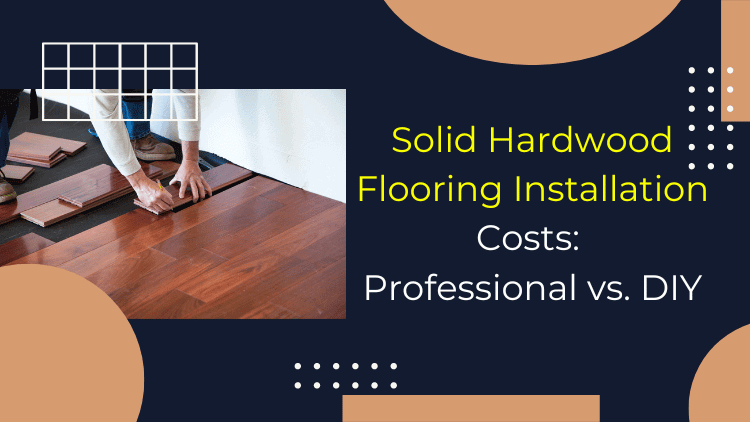Installing solid hardwood flooring can significantly enhance the aesthetic appeal and value of your home. When it comes to installation, you have two primary options: hiring professional installers or undertaking the project yourself.
While DIY projects can be rewarding, it’s crucial to assess the financial implications and benefits before deciding which route to take.
In this article, we delve into the costs (in effort and time as well as money) associated with professional hardwood flooring installation versus the DIY approach. By understanding these factors, you can make an informed decision and achieve the best outcome for your flooring project.
Let’s get started.
Table of Contents
Installing Solid Hardwood Flooring: DIY vs. Professionals
Installing solid hardwood flooring can transform the look and feel of your home, adding elegance and durability to your living spaces. One of the key decisions you must make is whether to hire professional installers or do it yourself. While both options have merits, it is crucial to understand the financial implications, benefits, and challenges associated with each.
The Cost of Professional Hardwood Flooring Installation
When opting for professional installation, it’s essential to consider the associated costs. Professionals typically charge based on factors such as the size of the area to be covered, the complexity of the project, and their level of expertise. Moreover, professionals may provide additional services like floor preparation, removal of existing flooring, and disposal of waste materials. While the cost of professional installation can vary, it generally ranges from $8 to $15 per square foot, depending on these factors.
Please note that these prices are not exact and may differ depending on your project and the service provider you choose. Also, removal or replacement of the subfloor will cost extra.
Now, let’s look at the benefits of hiring pros.
The Benefits of Hiring Professionals
-
Expertise and Skill
One of the primary advantages of hiring professionals to install your hardwood flooring is their expertise and skill. Experienced installers obviously have in-depth knowledge of the process, including proper subfloor preparation, acclimation of the wood, and ensuring the correct moisture level. Their expertise can result in a flawless installation and extend the longevity of your flooring.
-
Time and Efficiency
Professional installers have the necessary tools and resources, allowing them to complete the installation efficiently. They can accurately estimate the required time and work within a predetermined schedule. By hiring professionals, you save valuable time and ensure that your flooring project is completed promptly and without unnecessary delays.
-
Warranty and Insurance
Reputable flooring professionals commonly offer warranties for both their workmanship and the products they use. This provides peace of mind, knowing that any issues will be addressed promptly and at no additional cost. Furthermore, professional installers carry insurance, protecting you from any liability in case of accidents or damage during the installation process.
The Drawback of Professional Installation
-
Cost
Professional hardwood flooring installation is of course more expensive than the DIY approach. Hiring professionals involves paying for their labour, expertise, and additional services such as floor preparation and disposal of waste materials. As noted, the cost per square foot can vary depending on factors such as the project’s complexity and the region in which you live. These higher costs can be a deterrent.
-
Scheduling and Availability
When hiring professionals, it’s important to consider their availability and scheduling constraints. Depending on their workload and the season, you may need to wait for a suitable time slot. This could potentially delay your project, especially if you have time-sensitive deadlines or events.
-
Less Hands-On Involvement
Hiring professionals means relinquishing control over the installation process. If you enjoy hands-on work and want to actively participate in every step of the project, professional installation will not provide the level of involvement you desire.
-
Limited Learning Experience
DIY projects give you the chance to learn new skills and gain hands-on experience. By opting for a professional installation, you miss out on the learning experience and sense of accomplishment that comes with doing it yourself.
The Cost of DIY Hardwood Flooring Installation
While opting for the DIY approach may seem more cost-effective at first glance, it’s essential to consider all the associated expenses. DIY projects require you to buy or rent tools if you don’t have them, buy the flooring materials, and invest your time and effort into the installation. Additionally, any mistakes you make can lead to costly repairs or the need for professional intervention later on.
Let’s look at the pros and cons of DIY Installation.
The Benefits of DIY Installation
-
Cost Savings
Undoubtedly, one of the main reasons homeowners choose the DIY approach is to save money. By taking on the installation yourself, you can eliminate labour costs, potentially reducing your overall expenses. If you have experience with similar projects and possess the necessary tools, DIY installation can be a viable option to achieve considerable savings.
-
Sense of Accomplishment
Completing a DIY project successfully can provide a great sense of accomplishment and pride. If you enjoy hands-on work and have the necessary skills, installing your hardwood flooring can be a rewarding experience. It allows you to take full control of the project and tailor it to your preferences.
Factors to Consider
-
Skill Level and Experience
Before deciding to install hardwood flooring yourself, evaluate your skills and experience with similar projects. Improper installation can lead to structural issues, aesthetic flaws, or premature wear and tear. If you lack the necessary expertise, it may be wise to enlist professional help to ensure the best results.
-
Time and Availability
Installing hardwood flooring is a time-consuming task that requires careful planning and attention to detail. Consider whether you have the time and dedication to complete the project efficiently. Additionally, factor in potential disruptions to your daily routine during the installation process.
-
Project Size and Complexity
The size and complexity of the project are vital factors to consider. If you are dealing with a large area or intricate patterns, professional installers may be better equipped to handle the job effectively. Complex installations often require specialized techniques and tools that professionals possess.
The Drawback of DIY Installation
-
Lack of Expertise
Professional installers have years of experience and specialized knowledge in hardwood flooring installation. They are familiar with the best practices, techniques, and potential challenges that may arise during the process. Opting for DIY installation when you lack the necessary expertise can lead to mistakes, uneven flooring, or improper installation techniques.
-
Time and Effort
Installing hardwood flooring is a labour-intensive task that requires significant time and effort. From preparing the subfloor to acclimating the wood, laying each plank precisely, and applying the finish, the process can be time-consuming. If you have a busy schedule or limited availability, DIY installation is not the most practical choice.
-
Risk of Costly Mistakes
Without professional guidance, there is an increased risk of making costly installation mistakes. Incorrect measurements, improper cutting, or errors in subfloor preparation can lead to wasted materials and the need for expensive repairs. In some cases, these mistakes may require professional intervention, further adding to the overall cost.
-
Tools and Equipment
Proper hardwood flooring installation requires specific tools and equipment that may not be readily available in your toolbox. Purchasing or renting these tools will add to your overall expenses. Additionally, without the right tools, achieving precise cuts, seamless transitions, and a professional finish may be challenging.
-
Limited Warranty Coverage
Most hardwood flooring manufacturers offer warranties that protect against manufacturing defects or premature wear and tear. However, many warranties require professional installation to be valid. If you opt for DIY installation, you may void these warranties, leaving you responsible for any future repairs or replacements.
-
Physical Demands
Installing hardwood flooring involves physically demanding tasks such as lifting heavy planks, kneeling, bending, and working in uncomfortable positions. If you have physical limitations or health concerns, DIY installation may not be suitable for you.
-
Lack of Time Efficiency
A DIY flooring installation tends to take longer than a professional one due to the learning curve with the process and setbacks. If you have time constraints or need to complete the project quickly, hiring pros can ensure a more efficient and timely installation.
Choosing between professional hardwood flooring installation and the DIY approach is a significant decision with financial implications. While professionals offer expertise, efficiency, and warranties, doing it yourself can provide cost savings and a sense of accomplishment. Consider your skill level, available time, and the project’s complexity before making a choice. By carefully evaluating these factors, you can ensure a successful hardwood flooring installation that meets your needs and budget.











